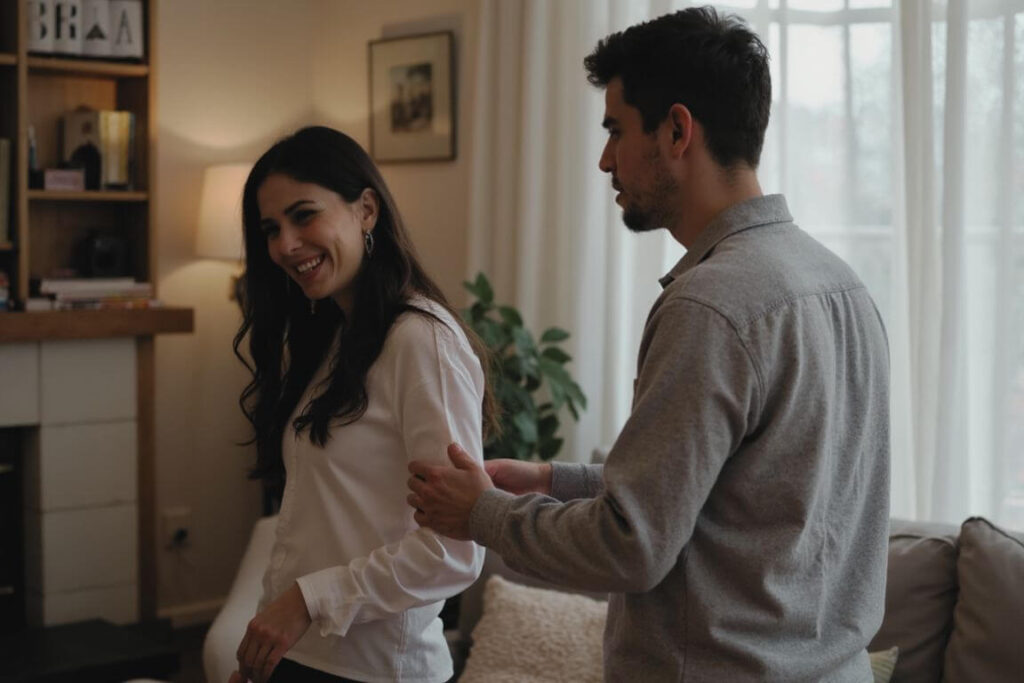Sometimes, you sense something is quietly stirring between you and him, yet when emotions deepen, he seems to pull back.
What if he does like you but is terrified of getting hurt? These subtle behaviors may be his way of protecting a fragile hope, not rejecting it.
As someone who’s guided many on this delicate path of early attraction, I’ll help you notice the gentle echoes of care hidden behind hesitation.
Understanding these clues can give you clarity without pushing, letting intuition and observation guide you forward. Here begins a friendly, expert-guided look at what might really be going on beneath his cautious exterior.
1. He stares at you in quiet moments
It’s not just a glance. This is the kind of quiet attention that happens when he thinks you’re not watching. He may linger with his gaze while you’re fixing your coffee, reading a message, or lost in thought.
That gentle, ongoing observation reflects curiosity and care. He isn’t surveying from across the room; he’s simply soaking you in, your smile, your expressions, the unguarded pace when you’re not performing.
Even if he shifts away when caught, his eyes find you again. You might notice him looking as you leave or admiring the way you laugh with others. These moments of silent focus are subtle, but revealing, his heart is quietly leaning in.
2. He acts nervous or fidgety around you
When someone is drawn to you but afraid of emotional pain, the body may respond before the mind does. He fidgets, taps fingers, plays with his drink or shifts in his seat without reason.
Words may tumble out, voices crack, or he stutters unexpectedly. He avoids eye contact or glances and then quickly looks away. Maybe he blushes, laughs awkwardly, or becomes overly quiet or suddenly chatty but jittery.
These are classic nervous‑habits mixed with attraction, often triggered by adrenaline, excitement or fear of rejection. Reddit users describe similar behavior: stumbling over words, face flushing, inability to maintain eye contact but wanting to connect nonetheless.
3. He remembers tiny details
The mark of real attention is the little things: your favorite snack, a fleeting anecdote, even the name of your childhood pet or a quote you mentioned months ago.
When he brings up those small facts, uncalled‑for, unsolicited. It shows he listens deeply and file‑stores those moments. That’s emotional investment disguised as casual conversation.
It might feel unexpected when he references something you thought was forgotten. He may quote a joke from one time you laughed, recall how you like your coffee, or recall your weekend plans before you even mention them.
This hint that he values your life and what you say, even the everyday details, reveals fondness held back by cautiousness, a sign he likes you but fears getting too close.

4. He offers help or support consistently, even when it’s not asked for
When someone quietly cares but fears being vulnerable, actions speak louder than declarations. If he regularly steps in, whether it’s helping you carry something, offering to run an errand, or checking in when you seem stressed. This is ongoing emotional support rather than rare favors.
These gestures show he’s paying attention and cares about your comfort. He may never frame it as romance, it may even feel overly practical, but the consistency matters.
It’s not just once in a while: it’s subtle, reliable involvement in your day. This behavior conveys loyalty and protectiveness, hints of affection under cautious restraint.
5. He seeks reasons to be near you
When someone likes you quietly but hesitates to say it, proximity becomes one of the most revealing clues. He may choose to attend the same events, sync up schedules, or linger in places where you’ll be, without directly asking to be with you.
Maybe he volunteers for projects you’re on, joins the same classes, or coincidentally shows up at your usual coffee spot at the same time. These patterns aren’t random.
They reflect a desire to share space with you, even if he doesn’t invite it outright. That steady presence shows emotional interest tempered by anxiety about saying or doing too much too soon.
6. He gives you subtle compliments, particularly about things others might not notice
Instead of generic praise, he zeroes in on tiny, personal qualities: how you express an idea, the way you gently correct someone, or a detail of your outfit that reflects your character.
These compliments feel personal, sincere, not like filler conversation. He might note something like how thoughtful you were in a group scenario, or how patient you were listening to someone else.
These observations aren’t glib; they reveal he’s listening deeply and noticing parts of you others might gloss over. The compliments feel selective and intentional, emerging when he feels safe enough to appreciate you, but not yet ready to go all-in emotionally.
7. His mood changes when you mention other guys
When you casually reference a male friend, coworker, or someone from your past, pay close attention to how he reacts.
A sudden tightening of expression, shift in tone, or brief silence can signal that he feels what you feel with someone else, creates discomfort. His body language might tense up, he may interrupt or dismiss the mention, or offer a snarky remark instead of normal curiosity.
These reactions come from insecurity masked by subtle defensiveness rather than aggressive jealousy. Research highlights that even a simple mention of another guy can trigger emotional withdrawal or passive aggressiveness, all rooted in fear of losing his place in your life.
When this discomfort occurs, it is often because he deeply values your attention but fears it might wander. These flickers of jealousy are not declarations. They are emotional clues that he cares, yet hesitates to feel vulnerable.

8. He pulls away or disappears after emotional moments
Sometimes when things start to feel emotional, perhaps you share something personal, or the atmosphere shifts toward deeper connection. He may suddenly go quiet or seem distant.
This hot‑and‑cold pattern can feel confusing: warmth one moment, withdrawal the next. Instead of staying present when your conversation deepens, he might cancel plans, become slow to respond, or change the subject altogether.
Often this behavior is rooted in relationship anxiety or fear of emotional exposure . He may appreciate the closeness but also fear the vulnerability that comes with it. In relationships where someone is afraid of getting hurt, emotional ease can feel threatening.
When this occurs repeatedly around meaningful moments, it’s a clear signal: he may like you, but pulls back to protect himself.
9. He keeps it light and avoids future talk
If the vibe between you feels easy and fun, that’s positive, but notice whether any talk of “what’s next” or future plans causes a shift. He may dodge subjects about next weekend together, or brush off possibilities like attending an event as “just taking it day by day.”
He might redirect emotional conversations with humor or vague responses like “Let’s not overthink it.” Experts point out that people with commitment concerns often resist even casual references to shared plans or future alignment.
This avoidance may show up as changing the subject or refusing to discuss anything that hints at long‑term intent. From a caring but cautious professional perspective, this behavior often means he wants to maintain connection without stepping into emotional exposure.
It’s like enjoying the view, but hesitating to build the road ahead.
10. He opens up about personal thoughts in private, yet won’t label the connection
When he shares something he usually never reveals, perhaps a personal fear, a childhood memory, or a day he found particularly hard. That is real emotional trust, not just casual chit‑chat.
These moments might happen in quiet one‑on‑one conversations and feel meaningful, but followed by a reluctance to define what your connection means. He might say things like “I haven’t told many people this,” or “You’re one of the few I can confide in.”
That level of access to his inner world tells you he values being seen and understood by you. Yet if he avoids calling it anything romantic or refrains from even hinting at labels like “dating” or “relationship,” that reflects caution.
He desires that closeness, but is still managing his fear of emotional exposure and getting hurt .
11. He does small protective gestures, quietly shields you in crowds, walks you home or checks in
If he subtly puts himself between you and discomfort, perhaps guiding you gently through a crowded room, walking you partway home, or later sending a message like “Got home okay?”-that shows quiet protectiveness.
These aren’t grand gestures, but the kind of supportive actions that come from caring enough to notice. He might step in if someone teases you harshly or make sure you feel safe in an unfamiliar place.
These gestures create emotional safety, something he may find easier to show through actions rather than words. He may not talk about commitment or feelings, but his attentiveness demonstrates a desire to be there for you in practical, grounding ways.

12. He uses humor to test your reaction, joking about liking you but quickly brushing it off
When a guy likes you but fears rejection, he may poke the waters using joking comments like “Maybe one day I’ll admit I like you,” or “Watch out, I might ask you out… in the far future.”
These lighthearted lines let him see how you respond, but if you don’t react in the way he hopes, he immediately shifts tone so it “was just a joke.”
That lets him save face and retreat without opening himself fully to emotional risk. If your response is warm or playful, he may gradually bring up similar joke‑confessions more confidently, seeing your reaction as a safe guide.
This pattern of teasing, testing, and retreating is a way to gradually build connection without having to face his own fear of being vulnerable
13. His friends drop hints or tease him around you, even if he hasn’t said anything yet
When his friends start nudging each other, smirking, or joking about you two in your presence, even when he hasn’t brought it up, that holds real meaning. Friends often spot what someone tries to keep quiet.
They might say things like “we all know he has a crush on you” or tease him openly whenever you are nearby. This playful banter is not random; it often comes from private conversations where he might have shared something.
Observers in online forums say that teasing from his group usually suggests they already know he’s interested in you, even if he hasn’t admitted it to you directly.
Importantly, if he reacts, smiles awkwardly, blushes, or doesn’t protest, they aren’t just jokes. They’re subtle revelations of his feelings woven into friendly pressure. Seeing this pattern shows his interest without him having to face vulnerability on his own.
In short, his friends acting like matchmakers, or at least like they know what’s going on, is a strong clue in this pattern of quiet affection mixed with caution.
How to observe more carefully and why this pattern matters
Now that you’ve seen the individual signs, let’s take a thoughtful pause to explore how to sharpen your awareness, why patterns like this matter, and how to reflect on what they might mean for you.
How to notice more carefully?
Take soulful stock of small moments: when you speak, does he linger with his gaze? When another guy comes up in conversation, does his expression shift subtly?
If his friends chuckle or nudge him around you, does he blush or pretend not to notice? Observing these patterns over time, rather than reacting to one-off comments, reveals consistency.
Keep in mind that these are not overt messages; they’re careful gestures that require gentle attention.
Why this pattern matters
Each sign on its own may feel inconclusive. But when you observe several together, quiet attention, nervousness, small acts of protection, teasing from friends, that forms a pattern of restrained care.
Recognizing the constellation rather than a single star gives you clarity about his emotional approach: someone who is interested but also cautious about vulnerability.
Self‑reflection prompts
How do you feel when these signs appear? Does your intuition feel affirmed by his friends’ behavior or by his awkwardness? Which signs appear most often?
Perhaps he’s most consistent with how he supports you, like being present or protective, rather than labeling feelings. Notice which behaviors repeat, and how they make you feel emotionally safe or curious.

What to do with what you observe
Tune your responses carefully. A gentle smile when his friends tease him, a lighthearted nod when he uses humor to test the waters, or engaging conversation when he shares personal thoughts, all help create emotional ease.
You don’t have to force definition, but you can reflect affection without pressuring. Observing how he reacts to your warmth may help him feel safer over time.
Engaging in this kind of mindful observation encourages you to trust your intuition, connect empathetically, and respond in ways that foster comfort, without needing him to label anything too soon.
Let those small consistent signals speak, and let your response match their delicate tone.
Tips Section
1. Don’t push, but observe timing
When some of those quieter signs begin to emerge, say he shares something personal, or steps in to help you unprompted. It often means he’s starting to feel safe enough to lean in. That is your cue to notice rather than accelerate.
If you gently reciprocate with warmth or curiosity, without pressing him to define things, you offer emotional comfort. It is that feeling of safety that nurtures trust.
On the other hand, pressing for clarity too soon may cause him to retreat again. Let his timing guide you, observe how his comfort grows before moving forward.
2. Let things unfold with patience. Don’t push too much, but don’t stay silent either
A common misstep is staying passive in hopes he will speak first. Silence can feel safe, but it may also leave him waiting indefinitely. Instead, show consistency in your presence through small gestures, ask open-ended questions, gently share your own thoughts, or bring up small future topics in conversation.
This lets him know you’re interested without cornering him emotionally. It provides reassurance. It gives room for gradual vulnerability. If you respond thoughtfully when he shows a flicker of openness, he may feel safer to explore more.
It is patience paired with gentle presence that often helps fear soften.
3. Gently open up if you feel that spark, mention shared future ideas “just in case”
If you feel drawn to him too, leaning in ever so slightly can help. Try weaving in casual future‑oriented comments, like “maybe we’ll make that plan one day if it feels right” or “if we both still want to do that concert in a few months…”.
These statements serve as soft invitations, signaling you’re open while leaving plenty of space. He might respond with interest or relief, or take more time.
Either way it sets a delicate tone of mutual possibility. This light opening allows you to communicate hope without asking for commitment. It invites connection while honoring caution, making room for real growth together.
Why these tips matter
These tips reflect the reality that someone who likes you but fears getting hurt is often navigating an internal struggle. Recognizing timing, offering warmth without demand, and gently opening a door toward shared possibility can encourage emotional safety.
As you become more mindful about his pace, and about your own, each small gesture builds trust rather than pressure. That sets the foundation for connection that may deepen naturally, rather than pushing before he’s ready.


